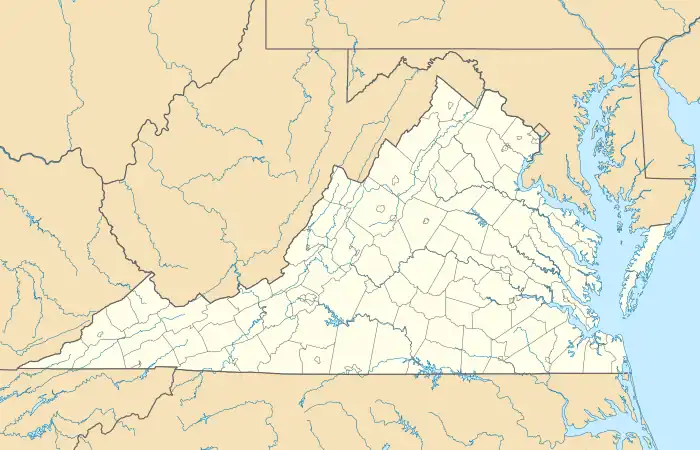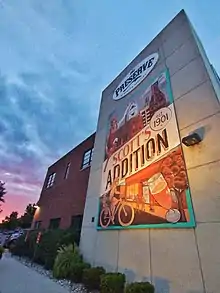Scott's Addition Historic District | |
 WTVR 6 Tower, July 2004 | |
  | |
| Location | Roughly bounded by Cutshaw Ave, Boulevard, and the Richmond Fredericksburg and Potomac RR, Richmond, Virginia |
|---|---|
| Coordinates | 37°34′06″N 77°28′21″W / 37.56833°N 77.47250°W |
| Area | 152 acres (62 ha) |
| Built | 1948 |
| Architect | Multiple |
| Architectural style | Colonial Revival, Classical Revival, Art Deco, et al. |
| NRHP reference No. | 05000896[1] |
| VLR No. | 127-6136 |
| Significant dates | |
| Added to NRHP | August 12, 2005 |
| Designated VLR | June 1, 2005[2] |
The Scott's Addition Historic District is a national historic district located in Richmond, Virginia.
History
Scott's Addition was named because it was a section of the 600-acre property inherited in 1818 by U.S Army General Winfield Scott from his father-in-law, Colonel John Mayo. Residential development began in 1890. Driven by the railroad, Scott's Addition was rezoned for industrial development in 1927. [3] During this time the neighborhood acquired the name "Scott's Addition" because its infrastructure was an addition to the city's electrical grid. [4]
Description
The district encompasses 284 buildings, 2 structure, and 2 objects that contribute to its historic nature, located in a largely commercial and industrial section of Richmond. It was developed after 1900, and includes representative examples of the Colonial Revival, Classical Revival, Exotic Revival[6] and Art Deco styles. Notable buildings include the Jones Motor Car Company (1926), the former Cadillac and LaSalle dealership (1928), The Hofheimer Building (1928),[6] Radio WMBG Broadcasting Station (1938), Boulevard Baptist Church (c. 1916), China-American Tobacco & Trading Company Warehouse (1920), National Biscuit Factory (Nabisco) (1923), G. F. O'Connell House (1920), State Planters Bank & Trust Company (1948), Chevrolet Parts Depot (General Motors Corporation) warehouse and training center (1929), Cavalier Arena Skating Rink (1940), the Binswanger Glass Factory (1946), Mid-Atlantic Coca-Cola Bottling Company Inc. (1953), and the Seaboard Building (1956).[7] It was added to the National Register of Historic Places in 2005.[1]
Craft Alcohol Boom
Virginia changed its blue laws to permit breweries to sell beer on site without offering food, and Scott's Addition became part of the "Virginia Beer Boom" in Richmond. Scott's Addition has been called the "booziest" neighborhood in Richmond, and is home to nine alcohol producers,[8] including breweries, cideries, a meadery, and a distillery, dubbed the Scott's Addition Beverage District.[9] Producers in the SABD are Vasen Brewing Company, Buskey Cider, Reservoir Distillery, Blue Bee Cider, Black Heath Meadery, The Veil Brewing Co., Bingo Beer Co., Three Notch'd RVA Collab House, Ardent Brewing Company, Isley Brewing Company, Strangeways Brewing Scott's Addition, Brambly Park, and Starr Hill Richmond.[10] In 2018, VinePair named Richmond the world's top beer destination for 2018.[11] Scott's Addition is an easy day trip spot from DC and North Carolina [12] in addition to tourists driving through Richmond on I-95 and I-64.
Real Estate
Scott's Addition continues to attract young professionals to the area, and the real estate market is building apartments to fit the uptick in interest. 1 Scott's Addition, the Summit, Symbol, The Preserve, Scott's Edge, The Scout, Scott's View, The Nest, Osprey Lofts, and The Icon are current apartments in the neighborhood, with many more under construction and in planning.[13] Five parcels were acquired on North Arthur Ashe Boulevard to build a mixed use 300-unit apartment complex an estimated finish in August 2024.[14]
References
- 1 2 "National Register Information System". National Register of Historic Places. National Park Service. July 9, 2010.
- ↑ "Virginia Landmarks Register". Virginia Department of Historic Resources. Retrieved March 19, 2013.
- ↑ "History of Scott's Addition". Retrieved August 6, 2022.
- ↑ Minimum, Alice (February 9, 2021). "How Every Neighborhood in Richmond Got Its Name". Retrieved August 6, 2022.
- ↑ "About Us: The Preserve VA".
- 1 2 Foretek, Jared (July 27, 2017). "Richmond Neighborhood Transformed with Historic Tax Credits". SavingPlaces.org. National Trust for Historic Preservation. Retrieved September 29, 2017.
- ↑ Kimberly M. Chen, Erika Schmelzer and Mary Porzio (n.d.). "National Register of Historic Places Inventory/Nomination: Scott's Addition Historic District" (PDF). Virginia Department of Historic Resources. and Accompanying photo and Accompanying map
- ↑ Bryan, Alix (February 22, 2016). "The secret behind Scott's Addition, Richmond's booziest neighborhood". WTVR-TV. Retrieved October 10, 2017.
- ↑ "Scott's Addition Beverage District". www.facebook.com. Retrieved February 18, 2020.
- ↑ "Drink Scott's Addition". Archived from the original on January 5, 2022. Retrieved January 7, 2022.
- ↑ O'Connor, Michael (February 27, 2018). "Henrico exploring changes to regulations for breweries, short-term rentals". Richmond Times Dispatch. Retrieved February 28, 2018.
The forthcoming ordinance amendments will take into account changes to the state code that have fueled Virginia's beer boom: In 2012, Virginia made it legal for breweries to offer tastings and sell their beer on-site and allowed fledgling breweries to use the facilities of more established beverage makers...VinePair recently named Richmond the world's top beer destination for 2018
- ↑ Kelsey Ables; Anying Guo; Fritz Hahn (November 13, 2021) [2021-11-11]. "Training our sights on a new city". The Washington Post. Washington, D.C. ISSN 0190-8286. OCLC 1330888409.
- ↑ "Plans underway for one of the biggest apartment buildings in Scott's Addition".
- ↑ "$80 million mixed-use apartment project planned near Scott's Addition; Buz and Ned's would have to move".


